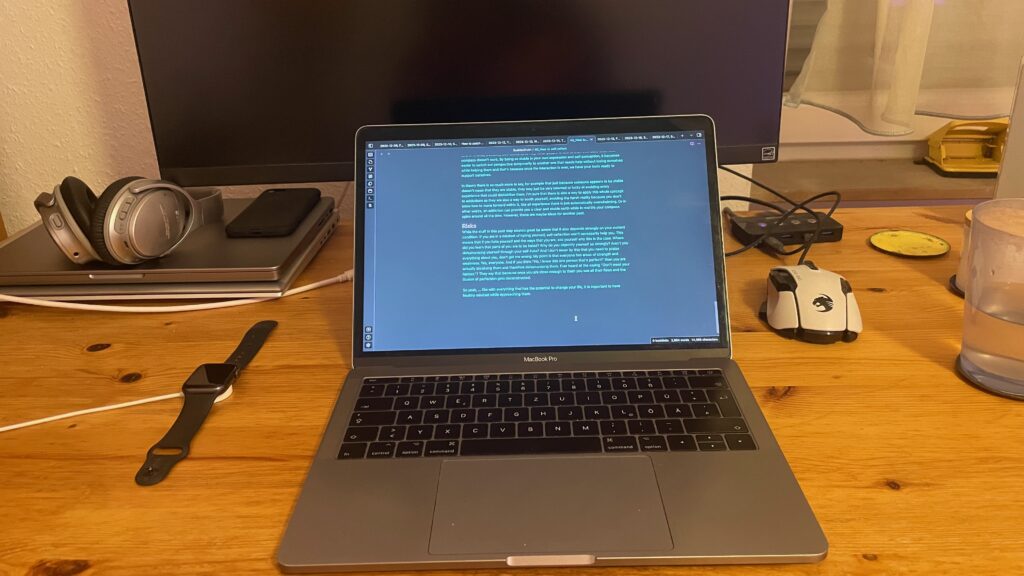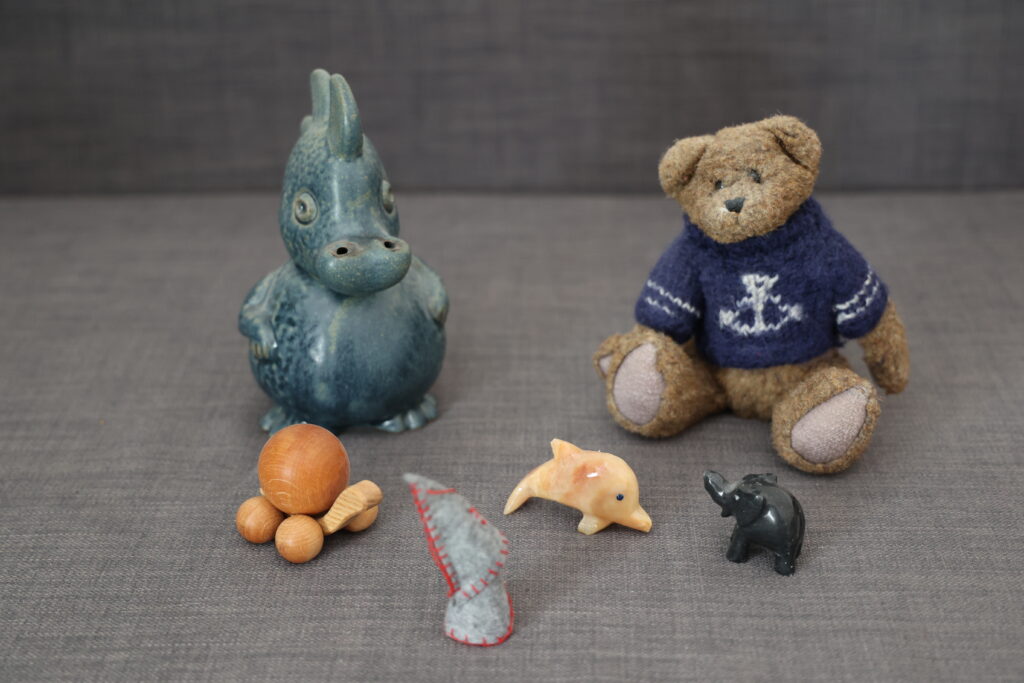I learned that this doesn’t come easy to everyone. As everyone of us experiences reality differently, we also experience ourselves reality differently. Some have a strong inner monologue and others have none at all. There are so many dimensions in how we can experience reality. Of course through our physiological senses but even they can have different sensitivities and interpretation and pattern recognition of them is something we adapt more and more over time through experience.
The idea – Finding your high fidelity
So, how does this play into self-reflection? Self-reflection is in other words a, sometimes delayed, perception and processing of our own expression. As you know living beings have natural gifts in certain areas to interact in defined ways with reality. This may gets recognised by the community around them which allows them to improve their natural abilities. However, in a situation where the community fails to recognise these gifts, this can lead to the case where we struggle to find our most effective way through life. In short, nature vs nurture plays here definitely a role.
However, assuming that everyone has certain gifts or talents, that may or may not be useful within the community or may even not be unique, these gifts show us a way of how to express ourselves.
In other words. An area in which we have a high fidelity to sense something and therefore process this information in a more complex way and extract structures that represent our reality perception is also the area in which we most likely are very good at producing output that is precise.
I make here the assumption that areas in which we are good at perceiving, processing and producing are also areas that will help us the most to see ourselves.
Examples
Okay, the previous part was a description of what you may be good at with complex words. What does this mean for you as a real human?
If you have children or ever observed children growing up you will notice how they experience challenges with certain things and others come at ease. While some may have a talent for recognising melodies and rhythm and reproducing them, others are good at seeing interactions between colours, shapes and symbolic representation of them. Maybe they also learn quite early on to express themselves very well in words or are good at interactions with animals. or they are good at interacting with other people recognising certain social structures, interactions and how the find a path through them in search for achieving a certain goal. Maybe they are good at perceiving how things move through space or how things interact with each other and therefore have a talent to become some a sort of craftsman or engineer in the end. Maybe they are good at thinking through what they perceive and therefore experience less failures as they are good at creating patterns and structures in their mind. Or they are very good at taking action first and asking questions later which allows them to fail fast and therefore gather more experience quantity-wise, not necessarily quality-wise.
So, let me ask you. Where are you in your element? Where do you perceive high levels of complexity? Are you using this area of high fidelity often? Is it something that is valued by your community when you express yourself in this area? Or do they fail to recognise the structures that you develop?
Like, do you have somebody that you can exchange with when you want to express something in this area? Or do you hear from them just an agreement or disagreement but no expression of themselves in your style/fidelity?
You can also see you style, your area of high fidelity as your language, your way to express yourself in your own tongue, not mother tongue, but your own one.
Application – Record
So, you found your own language, your own tongue, I hope. You may not yet be able to express yourself in it fluently. Not because you have no talent but because you did not had enough chances to gain experience! However, self-reflection is actually an attempt to change that! To really train, with yourself, your mirror image, if you want to say so.
For this we need a way to record your expression.
For your thoughts in a spoken language like English this may be ease. Attempt to write. If you have the possibility, experience the differences of how it impacts your expression whether you write with your hand, a keyboard, or maybe even using a tool that automatically transforms your speech into written words. What allows you to maximise your attention on your self-expression at this time? Is writing with your hand slowing you down? Is speaking bad because it doesn’t keep your brain busy enough during the thoughts and you start to be disrupted by your perception of the environment? … When you write, also be aware in what surrounding and environment are you writing? Do you need music, silence or a busy café house sound around you to focus on your train of thoughts? Maybe your thoughts flow the best out of you directly after waking up, or going to bed, or after a nice walk in the sun?
This takes repetitive trials to learn what brings you the most satisfying output. There is not only a dependency on your environment and how you express your spoken language but also what you want to write about and your internal state. Like, do you want to create new ideas with your writing, or do you want to connect the dots of an idea that you had some moments, days or weeks ago? Like, is there a structure that you already can follow or is this an attempt of identifying a first structure in the perceived chaos?
Over time you will hopefully become an expert for your own tools of expression.
Sometimes words aren’t enough, and these moments I noticed how unrefined my ways of artistic expressions are. Like, I have a picture, a scene, a movie in my mind but I don’t have ways to express it in ways that feel satisfying. It’s like I can produce stick-figures while I think of whole humans in action.
But nonetheless, for others this is exactly their way of expressing their experience. They may express themselves through exactly the right construction of colour, forms, structure, type of material and symbolic language. The same goes for music, where certain melodies and rhythms can express certain scenarios.
And people that are very much in tune with their body and can perceive it up to a high detail and influence it in ways so that it changes are also able to express their thoughts in this way.
The question that I can’t answer for you because it is not my field of expertise is “How do you record the expression of your body”? Or is in this case a representation through the visual enough for you, just like my written words are only a record of the spoken language but not of the whole thought process and my internal experience while I write? As I said, I can’t answer it but I hope you see the patterns of how to record expressions and identify therefore your own way.
Application – Perceive
Okay, so now you hopefully gained some experience of how to record your own expressions where you experience a high fidelity. The next step is to perceive what you expressed. And I know, we sometimes learned shame around our own self-expressions from childhood but hey, we try to learn here something, how to self-reflect. So, an element that is important in this context is time because depending on how much time has passed since our recording our whole reality perception may moved into a different status. This different status allows us to perceive the recording as if it is from somebody else but, and that’s important, this recording comes from someone that is capable to express themselves in a complex way because of their high fidelity.
So, when you are perceiving your records try different temporal distances. Like perceive it directly after the recording finished. Take walk and then perceive it. Perceive it the next day, week, month, year, decade.
There are multiple things to learn here.
On the one side you will strengthen your capability to express yourself because of the training. This means while your first records may be ‘cringe’ you will actually also realise new details. Like, where was your expression not good or clear enough? Would you express the same thing differently nowadays because you have more context and experience and you can add more details at the right places in your recordings to prevent misunderstandings?
On the other side you may will also be surprised by your own expressions of the past, how clever and thoughtful they were, with how much intention they were expressed. Like, what a pure form of expression they are because they are expressed for a recording for your future-self and not for someone else where you need to adapt your language which always leads to loss of information as you need to abstract certain expressions so that someone else can understand them and don’t get completely lost.
Trust me with this that once you learned how to self-express, self-record and then perceive your self-reflection, you don’t want to miss this anymore. It is as if you are understood on a level that no one else ever did or could.
What now?
So, you learned your area of expertise, your area of high fidelity, where you perceive details and can express details in a form that allows high complexity.
You learned how to record your self-expression and will hopefully get better over time with it to know where to adapt your actions and your environment.
You learned different kind of implications that perceiving your self-expressions actually has and how learning how to speak your own tongue with yourself allows you to perceive yourself in completely new ways.
There is one last thing that is important. While we focused a lot in this post on the self in context of expression and perception, there is also another aspect. It will change your interactions with others.
When we perceive information from around us, be it in the way that a friend tells us what is happening to them, or us reading the news, or going to a concert, in these situations we often immerse so intensely that we feel disconnected from ourselves. At least in these moments. And while it can be beautiful to be completely in the moment when you are listening and dancing to a concert, you can even more enjoy it if you have the tools the express yourself when you come home and aren’t at the concert anymore.
The thing with totally immersing experiences is that they can feel so intense that they become us and once we go away from them, we feel like we lost a part of ourselves.
True North/True Self
Let me use here a metaphor.
You know that a compass is used to know in which direction to go, right? A needle in a compass should always show towards north. Imagine that ‘north’ is in this case ‘yourself’, the one you truly are. Now, we may experience things in our life that act like magnets and they will influence what our compass shows as north, as ourselves. This means that some experiences in our life act strong enough that we mistake them for being our identity. And sure, sometimes this events pass by and the influence of this magnet decreases until our compass can show again towards our ‘true-self’. Now, self-reflection is a tool that allows us to strengthen our true-north, true-self. Our true-self becomes a stronger magnet and therefore we less often get lost by events in our life.
Take for example the death of a loved one. If we don’t know ourselves and also not how to express ourselves so that we actually feel seen and also can see ourselves, we kind of get lost through this event. This event tells us that it is our true north and by manipulating our compass we can’t find our way forward in life, our compass doesn’t tell us anymore what it is supposed to tell us. We are getting lost.
However, if we know ourselves and ways to self-reflect, we can actually process the event of the death of a loved one. We can express, process and perceive what they meant to us and find our peace with such an event.
Outro
One more thing… while self-reflection supports us in keeping a strong true-north and true-self in all kind of events, it actually also allows us to help other people to find to their true-selfs when their compass doesn’t work. By being so stable in your own expression and self-perception, it becomes easier to switch our perspective temporarily to another one that needs help without losing ourselves while helping them and that’s because once the interaction is over, we have your tools ready to support ourselves.
In theory there is so much more to say, for example that just because someone appears to be stable doesn’t mean that they are stable, they may just be very talented or lucky at avoiding every experience that could destabilise them. I’m sure that there is also a way to apply this whole concept to addictions as they are also a way to sooth yourself, avoiding the harsh reality because you don’t know how to move forward within it, like all experience there is just automatically overwhelming. Or in other words, an addiction can provide you a clear and stable north while in real life your compass spins around all the time. However, these are maybe ideas for another post.
Risks
While the stuff in this post may sounds great be aware that it also depends strongly on your current condition. If you are in a mindset of hating yourself, self-reflection won’t necessarily help you. This means that if you hate yourself and the ways that you are, ask yourself why this is the case. Where did you learn that parts of you are to be hated? Why do you objectify yourself so strongly? Aren’t you dehumanising yourself through your self-hate? And I don’t mean by this that you need to praise everything about you, don’t get me wrong. My point is that everyone has areas of strength and weakness. Yes, everyone. And if you think “No, I know this one person that’s perfect!” then you are actually idealising them and therefore dehumanising them. Ever heard of the saying “Don’t meet your heroes.”? They say that because once you are close enough to them you see all their flaws and the illusion of perfection gets deconstructed.
So yeah, … like with everything that has the potential to change your life, it is important to have healthy mindset while approaching them.
This is going to be short but important. Have you ever wondered what you would do if you win the lottery or did you dismiss . . .
Do you know ear worms? Like, these catchy songs that repeat themselves again and again in your audio imagination. You hum them, you may even . . .
If you read my other post about how to give emotions more words you already know that my description of sadness is “an experience of . . .
This post will provide you yet another metaphor of how trauma and emotional burdens can look like. My previous metaphor for this you can find . . .
This post is about about how self-love helps us to get out of survival mode and avoiding coping mechanisms. It is about finding yourself and . . .







